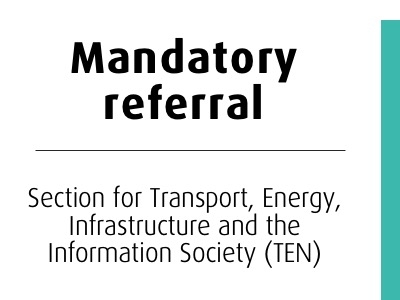European Economic
and Social Committee
Revision of Port state control Directive
Background
Port State Control (PSC) is an important aspect of ensuring maritime safety. It is a system of inspection of foreign flagged ships by inspectors called port state control officers (PSCOs) in their ports, for the purpose of verifying that the competency of the crew on board and the condition of the ship and its equipment comply with the requirements of international conventions on the safety of life at sea and on the protection of marine environment. Directive 2009/16/EC was adopted as part of the third Maritime Safety Package and it provides for a legally binding inspection regime.
In 2018, the Commission concluded an ex-post evaluation of Directive 2009/16/EC as a part of the Maritime Fitness Check. The outcome confirmed that the PSC Directive is relevant, effective, and efficient and brings added value at EU level, playing a key role in enforcing International Maritime Organization (IMO) and EU standards, thereby contributing to a high level of safety, security and sustainability of maritime transport as well as ensuring a level-playing field between Member States.
However, since it was adopted there have been significant technological changes and IT driven progress and the Directive should be updated to take account of this.
Key points
The EESC:
- advocates that the amendments of the Directive must take into account core EU policy priorities related to the Green Deal, the EU and UN Sustainable Development Goals agenda, human and workers' rights and social cohesion. Thus, the revised parts of the Directive must provide clarity on minimum working conditions for seafarers, the conservation of waters and fish, and environmental protection as a whole.
- Port State control (PSC) requires a qualitative and quantitative upgrade of personnel, since the new regulation, based on International Maritime Organization rules, is more demanding, and inspection skills must be improved technically and operationally. It is therefore essential to finance the upskilling and reskilling of PSC officers via up-to-date training courses. The EESC welcomes the fact that the European Maritime Safety Agency (EMSA) has been made responsible for designing and offering training courses to the EU Member States' agencies to enable them to better fulfil such requirements.
- emphasizes that Member States must ensure that there will be a common, unified and mutually approved methodology and certification process for digital monitoring and exchanges of information for all types of vessels. The EESC supports the use of electronic certificates.
Additional information
Section: Transport, Energy, Infrastructure and the Information Society (TEN)
Opinion number: TEN/818
Opinion type: Mandatory
Rapporteur: Panagiotis Gkofas (Civil Society Organisations - Group III / Greece)
Referral: COM(2023) 271 final 2023/0165 COD COM(2023) 271 final 2023/0165 COD
Date of adoption by section: 6 September 2023
Result of the vote: 25 in favour, 0 against, 0 abstentions
Date of adoption in plenary: 20-21 September 2023
Result of the vote: 212 in favour, 1 against, 2 abstentions
Contact
Marco Pezzani
Press Officer
Tel.: +32 2 546 9793 | Mob: +32 470 881 903
E-mail: marco.pezzani@eesc.europa.eu
António Ribeiro Pereira
Administrator
Tel.: +32 2 546 9363
